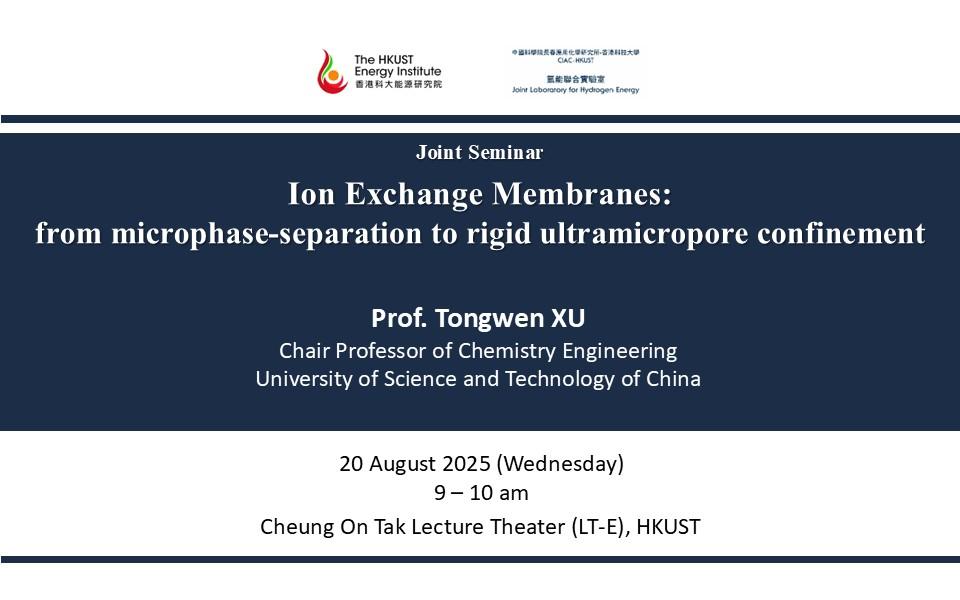Ion Exchange Membranes: from microphase-separation to rigid ultramicropore confinement
Supporting the below United Nations Sustainable Development Goals:支持以下聯合國可持續發展目標:支持以下联合国可持续发展目标:
Environmental and energy-related technologies, including redox flow batteries, fuel cells, water electrolysis, electrochemical carbon capture, and electrodialysis-based ion separation, are pivotal in achieving the dual objectives of peak carbon emissions and carbon neutrality. These technologies rely fundamentally on electromembrane processes, where ion exchange membranes (IEMs) play a critical role by enabling selective ion transport and separating anode and cathode reactions. Traditional IEMs, such as those based on perfluorocarbon Nafion and hydrocarbon polyelectrolytes, are well-established and feature microphase-separated structures. However, they are hindered by the well-known conductivity/selectivity trade-off, which limits their performance in advanced applications. To address this challenge, our research group has pioneered a new paradigm in membrane design: utilizing rigid confined micropores as ion channels. This innovative approach has been realized through membranes fabricated from charged polymers of intrinsic microporosity, hyper-crosslinked polymers, and ultramicroporous polymer frameworks. The rigidly confined micropores in these next-generation membranes offer a unique combination of high size-exclusion-imposed ion selectivity and high free volume-induced permeability. Remarkably, by leveraging rigid pore confinement and multi-interaction mechanisms between ions and the membrane, triazine framework membranes have achieved near-frictionless ion flow, setting a new benchmark for ion transport efficiency. As next-generation IEMs, these micropore-confined membranes have already demonstrated exceptional performance in organic redox flow batteries and water electrolysis systems. We are confident that their potential extends to a wide range of other electromembrane processes, further advancing the development of sustainable energy technologies. In this presentation, we will provide an overview of traditional IEMs developed in our laboratory and highlight the ground breaking applications of next-generation IEMs in flow batteries and water electrolysis.
Dr. Tongwen Xu is Chair Professor of Chemistry Engineering at University of Science and Technology of China (USTC). He obtained B.E (1989) and M.E. degree (1992) from Hefei University and Technology and Ph.D from Tianjin University (1995). Dr. Xu joined the USTC as an associate professor in 1997 and was promoted to a full time professor in 2001. Dr Xu was a short-term visiting scientist of the University of Tokyo (2000), Tokyo Institute of Technology (2001) and also a Brain-Pool Professor of Korea in Gwangju Institute of Science and Technology (2006-2007). The research interests of Dr. Xu are focused on the development and practical applications of ion exchange membranes. Dr. Xu is dedicated to the industrial applications of ion exchange membranes, including diffusion dialysis (DD), electrodialysis (ED), bipolar membrane electrodialysis (BMED), water electrolysis and flow batteries. He now has authored >600 publications (including Nature, Angnew Chem, Nature Sustainability, JACS, AM, et al), 7 Books, 20+ Chapters, and holds 110+ patens . He is named as a highly cited researcher by Thomson Reuters (ISI Web of Knowledge) with over 33000+ citations and H-index of 94. Prof. Xu is the Editor of Journal of Membrane Science, and editorial boards of Advanced Material Technologies, Heliyon, Advanced Membranes, and etc. Prof. Xu’s contribution to ion exchange membranes and related processes has brought him numerous awards, including Cheung Kong Scholars (2014), K.C.Wong Talent Award (2016), Hou Debang Award of achievements (2020), National Award for Technological Invention (2018) and National Labor Medal(2024), et al.
